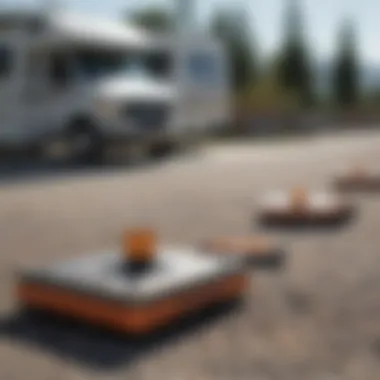The Importance of Heavy Duty RV Leveling Blocks


Intro
As the allure of the open road and the call of the great outdoors continue to captivate many, the importance of safety and stability in recreational vehicles has never been clearer. Heavy-duty RV leveling blocks may seem like a small addition to your travel toolkit, but they can make all the difference between a peaceful night’s rest and a frustrating experience on uneven terrain. This article dives into the significance of these objects, other than just the obvious purpose of keeping your RV level. Their material composition, essential features, and many practical applications form the crux of this guide, ensuring readers grasp both the technical specifications and real-world implications.
In this era where outdoor adventure meets modern technology, understanding how these leveling blocks function can elevate one’s camping experience from mediocre to extraordinary. With many RV owners seeking to fine-tune the details, heavy-duty leveling blocks represent a simple yet powerful tool, yet often overlooked. We’ll explore user experiences and include vital maintenance tips tailored for those who want to maximize their gear's longevity. Moreover, we’ll dissect market trends along with a comparative analysis of popular products available now.
Let’s roll right into the core of this examination by weighing the essential performance metrics of heavy-duty RV leveling blocks.
Understanding RV Leveling Blocks
When it comes to enjoying your time on the road, understanding RV leveling blocks is pivotal. These essential tools function as stabilizing units that help ensure your recreational vehicle is level when parked. A level RV is not merely about comfort; it's crucial for safety and functionality, impacting everything from appliance operations to your overall experience.
Definition and Purpose
RV leveling blocks are sturdy devices designed to support and elevate the tires of a motorhome or trailer when parked on uneven ground. Think of them as the unsung heroes of campsite stability. You place these blocks underneath the tires to raise the vehicle to of its level height, which can prevent mishaps ranging from sloshing liquids in your refrigerator to doors that don’t swing open effectively. They come in various materials but all serve to balance the weight of the vehicle evenly when parked.
Importance in RV Stability
The importance of leveling blocks cannot be overstated. Imagine arriving at a site and parking your RV on a slope. Without leveling, your vehicle might lean in a way that puts unnecessary stress on its components. Some may brush this off as a mere inconvenience, but it can lead to serious issues, including strain on the suspension and complications with plumbing – especially in the black and gray tanks.
"An unlevel RV can lead to discomfort, safety issues, and long-term damage."
Most importantly, a properly leveled RV allows for effective drainage, vital when dealing with waste systems. If your RV isn't level, resting wastewater can lead to clogs and unwanted odors. This stability extends to the comfort of those inside, as an uneven RV can cause everything from trouble sleeping to accidents as items shift around. Therefore, understanding and using leveling blocks is essential for a seamless RV experience.
Types of Leveling Blocks
When it comes to the stability and safety of RVs, the choices and types of leveling blocks play a crucial role. Each material offers its unique set of advantages and disadvantages, impacting everything from ease of use to durability. Understanding the differences between plastic, wooden, and metal leveling blocks allows RV owners to make informed decisions based on their specific needs.
Plastic Leveling Blocks
Plastic leveling blocks are popular for their lightweight nature and ease of handling. Often made from high-density polyethylene, they resist cracking and fading under various environmental conditions. One of the primary reasons RVers gravitate towards these blocks is the straightforward stacking feature that helps create a stable foundation quickly. However, they might lack the robust load-bearing capacity compared to their metal counterparts.
Plastic blocks also tend to be less expensive than wood or metal options, appealing to budget-conscious individuals. On the flip side, they may not provide the same level of grip on slick surfaces, which can be a concern for those frequenting wet or uneven campgrounds.
Wooden Leveling Blocks
Wooden blocks have a rustic charm and are often favored for their solid construction. Typically made from treated lumber, these blocks are durable and can bear significant weight, making them suitable for larger RVs. The natural grip provided by wood is another advantage, helping to keep the RV stationary when parked over uneven terrains.
However, wooden blocks come with their own set of challenges. They are prone to absorbing moisture, which can lead to rot over time. Additionally, their weight can be a downside for some RV owners who prefer lighter materials. Proper maintenance, like regular sealing, is essential to extend the life of wooden blocks, adding to their overall cost over time.
Metal Leveling Blocks
Metal leveling blocks, particularly aluminum and steel options, are known for their ruggedness and superior load-bearing capacity.
Aluminum Options
Aluminum leveling blocks are highly coveted for their lightweight yet sturdy design. Resistance to rust makes them an appealing choice for avid road trippers who may encounter various weather conditions. Their modular design allows for customization, as they can easily be stacked to fit the needs of different RV models.
A noteworthy characteristic of aluminum is its durability without the bulk; owners appreciate the balance between performance and manageability. However, aluminum can be more costly upfront compared to plastic or wood options. Additionally, some users may find that they don't grip as well on slippery surfaces, which is a vital consideration when setting up camp.
Steel Variants
Steel leveling blocks provide unmatched strength and stability, making them ideal for heavy-duty usage. With the ability to support substantial weight, they are often favored by owners of larger RVs or trailers. One key trait of steel is its resilience, ensuring that these blocks last through years of heavy use.


However, the trade-off with steel includes increased weight and the potential for rust if not properly treated. For those who consider longevity and strength paramount, steel blocks offer a powerful solution, albeit with some necessary considerations for care and handling. Users need to be mindful of storing them properly to avoid corrosion and maximize performance.
By understanding the distinctions among plastic, wooden, and metal leveling blocks, RV enthusiasts can make well-informed decisions tailored to their specific requirements. Each type provides a different experience and can greatly affect the convenience and stability they expect from their RV adventures.
Key Features of Heavy Duty Leveling Blocks
When it comes to maintaining the integrity and safety of your RV, understanding the key features of heavy-duty leveling blocks is crucial. These blocks aren't just simple accessories; they're essential in ensuring that your recreational vehicle remains steady and balanced, especially in uneven terrains. There are several critical elements to consider, including load bearing capacity, surface grip, and durability, which together help in making an educated decision on which leveling blocks would suit your needs best.
Load Bearing Capacity
Load bearing capacity is a fundamental feature of heavy-duty leveling blocks and should be a paramount consideration when selecting the right set for your RV. Simply put, this capacity determines how much weight the blocks can support without deforming or collapsing.
For example, if you have a larger class A motorhome, which can weigh anywhere from 12,000 to 36,000 pounds, your leveling blocks must be designed to accommodate that weight without faltering. Choosing blocks that exceed the weight requirement is a smart approach, ensuring that even loaded with gear, the RV won’t tip or sway. On the other hand, using insufficiently rated blocks can lead to accidents or significant damages. A common recommendation is to look for blocks that are rated at least 2,000 pounds more than your RV’s weight for optimal safety.
Surface Grip and Stability
Surface grip refers to the ability of leveling blocks to maintain traction with the underlying ground. This feature plays a pivotal role in keeping your RV stable, especially in muddy or slick conditions. The last thing anyone wants is a top-heavy RV teetering on the edge of an embankment!
Most heavy-duty leveling blocks, such as those made from textured plastic or metal, provide enhanced grip due to their designs. These materials often have surface textures or patterns specifically created to maximize friction against the ground. It is also wise to pay attention to the type of ground you’ll be parking on. In campgrounds or sites with loose sand or gravel, blocks with excellent grip are indispensable.
Durability and Weather Resistance
Lastly, durability and weather resistance are what separates the seasoned RV owner from the novice. Heavy-duty leveling blocks must endure not only the weight of the vehicle but also various environmental conditions. Rain, snow, heat, and UV exposure can all take their toll on inferior products. Therefore, investing in robust materials like high-density polyethylene or powder-coated metal can greatly extend the life span of your blocks.
Moreover, some blocks are designed with UV protection, preventing them from becoming brittle when exposed to the sun over extended periods. A sturdy set of leveling blocks that can endure extreme temperatures and environmental stressors ensures peace of mind when parked in diverse locations.
"A good quality leveling block can be a game-changer, ensuring not just comfort but downright safety during travels."
In summary, weighing these key features—load bearing capacity, surface grip and stability, and durability—will go a long way in enhancing your RV experience. Choosing the right heavy-duty leveling blocks not only provides stability but also safeguards against potential mishaps that can lead to both physical and financial tolls.
Selecting the Right Leveling Blocks
Choosing the correct leveling blocks for your RV is no trivial matter; it plays a pivotal role in ensuring stability and safety while you’re parked. Just think about it—you're out in nature, perhaps surrounded by the peaceful sounds of rustling leaves or a bubbling brook. To enjoy this bliss, your RV needs to sit flat and secure, avoiding any unwanted rocky rides during the night. The right leveling blocks help you achieve that, making the selection process a key focus in this article.
Several factors come into play that can greatly influence your choice. You might find yourself asking questions about the terrain you’ll be parked on, how much weight your vehicle carries, and how portable and durable you need the blocks to be. These elements contribute to both the performance of the blocks and your overall camping experience.
Assessing RV Requirements
To find the best leveling blocks, it’s crucial to first figure out your RV's specifics. This includes knowing the load capacity and understanding the weight distribution.
- Weight Considerations: Start by checking the Gross Vehicle Weight Rating (GVWR) of your RV. This tells you how much weight the vehicle can safely support, including passengers and cargo. If you consistently travel with more gear, consider that when selecting your leveling blocks.
- Dimensions: The height also matters. Some RVs may require additional lift while others might need a more snug fit with a shorter block. Make sure to measure the height of your vehicle's tires off the ground to find the right size of blocks.
- Usage Patterns: Think about where you usually park. If it’s often in uneven terrain, opting for blocks designed to navigate rough surfaces might be wise.
Understanding these requirements not only sets the stage for finding the right product but also gives you peace of mind while you're away from home.
Evaluating Available Space
After you’ve sorted out the weight and dimension needs, the next step is checking the space where you'll be using the leveling blocks. This includes your RV’s storage capacity and the locations that you typically park.
- Storage Capacity: Heavy-duty RV leveling blocks can be bulkier than standard options. Whether you’re hoisting them into the back of a pick-up or shoving them into an external compartment, make sure they fit. Measurements of your RV's storage zones are necessary to avoid last-minute surprises.
- Parking Environment: Is the ground flat, rocky, or sandy? Leveling blocks might sink into soft ground or slide on wet surfaces. Evaluate the geographic areas where you camp most often and how those conditions will influence your block choice.
"Choosing the right leveling blocks helps to make your travels more serene and your RV experience smoother. Investing in quality means you'll have less hassle down the road."
Ultimately, selecting the right leveling blocks for your RV isn't just about grabbing what fits. It’s about analyzing your vehicle’s needs and the spaces in which you plan to operate. Taking these considerations into account ensures that your time on the road is as enjoyable as possible.
Practical Applications of Leveling Blocks


When it comes to using heavy-duty RV leveling blocks, understanding their practical applications can significantly enhance your camping experience. These blocks are not merely tools but essential for achieving stability and safety in various scenarios. Knowing where and how to use them is vital for maintaining the longevity of your vehicle while ensuring comfort for those inside.
In Campgrounds
Campgrounds often present uneven terrains that can make leveling an RV quite the chore. Picture this: you pull into a beautiful site by a lake, but the ground slopes down towards the water. By thoughtfully utilizing leveling blocks, you can elevate your RV enough to achieve a flat surface for your living space. This prevents issues like sliding furniture or, worse, spills from your drinks rolling off the table.
The blocks provide easy-to-use solutions for various setups. Here are some tips:
- Assess Terrain: Before positioning your RV, take a good look at the site. Identify where the ground is highest and plan accordingly.
- Choose the Right Block: Depending on the slope, a thicker block may be necessary. You want rugged, heavy-duty blocks to handle the weight of your RV.
- Use in Pairs: When leveling, it’s often a good idea to place blocks under both front and back wheels. This evens the RV out, ensuring stability.
"Proper leveling ensures not only comfort, but also enhances the longevity of your RV components."
Select blocks that have a non-slip surface. Many experienced RVers recommend models that interlock, which can offer added safety and support. The benefits really shine through during extended stays. You won't have to worry about waking up to uneven surfaces or shifting furniture.
During Renovations
Leveling blocks display their usefulness not just in campgrounds, but also during home renovations of the RV itself. When it comes to making modifications—be it for aesthetic enhancements or functional upgrades—stabilizing the RV is crucial.
For instance, if you’re swapping out a worn-out carpet for hardwood flooring, a steady platform is essential. Here’s how to effectively use leveling blocks in such scenarios:
- Support During Upgrades: When you lift any part of the RV for repairs, having your vehicle on solid ground prevents it from rocking or swaying.
- Temporary Shelving: If you have block stacks outside, consider using them for temporary shelving to hold your tools and materials while working.
- Even Weight Distribution: Achieving balanced weight across all corners of your RV ensures that the floors and fixtures bear wear evenly.
By taking a little time to strategize your use of leveling blocks during renovations, you ensure not only safety but also increase the efficiency of your labor. An added perk? You may even find you do not need to rent as much equipment when effectively using leveling blocks.
By recognizing the practical applications of RV leveling blocks, you can enhance not only the stability of your vehicle but also make your overall travel experience smoother and more enjoyable.
User Experiences and Reviews
Understanding user experiences is like having a front-row seat to real-world applications of heavy-duty RV leveling blocks. These insights not only highlight the blocks’ effectiveness under various circumstances but also offer potential users a grounded understanding of their functionalities and limitations. The feedback from RV owners becomes a compass, helping prospective buyers navigate the myriad options available in the market.
Practical Feedback from RV Owners
Advantages Observed
Many RV owners praise the versatility of heavy-duty leveling blocks. One common observation is their robust load-bearing capacity, which allows them to support a range of RV weights without buckling. This characteristic is pivotal because it ensures safety when setting up camp on uneven terrains. The confidence that comes from using these sturdy blocks cannot be understated. A user might comment, "I’ve parked on some seriously lumpy ground, and these blocks held up like champs!"
Another advantage is the ease of use. Most models on the market are designed so that even novice RVers can set them up without a hitch. This simplicity encourages more people to get outdoors without the fear of instability. One enthusiastic owner noted, "It’s like stacking Legos! Just pile them up under the tires, and you’re golden."
However, it’s important to mention that while performance is often lauded, some users also highlight the weight of these blocks. Heavier varieties can be a hassle to transport, especially for those with limited storage space in their RV. This aspect doesn't necessarily diminish their value; rather, it prompts users to weigh their needs against the benefits they provide.
Challenges Encountered
Not every review shines a light of positivity, however. Some users report challenges with storage. Many heavy-duty blocks can take up considerable space, particularly if you are using a large set. For the RV owner trying to optimize their limited storage, this can be a thorny issue. A common sentiment goes like this: "I love these blocks on uneven ground, but man, they eat into my storage space like a hungry bear!"
There's also the concern of compatibility with newer RV models. Some users have noted that certain designs may not fit as well with newer RV fashions or chassis styles. An owner might point out, "They’re great, but I had to get creative with positioning due to the recent RV design."
Comparison Across Brands
Brand-to-brand comparison unveils a variety of features that can truly set the best options apart. While some brands focus on affordability, offering lower price points, others shine in terms of durability and design cleverness. The right choice often leans on personal experiences shared among the RV community.
When diving into comparisons, several users mention brands like Camco and Anderson as having a reputable standing. Many RV enthusiasts report that Camco leveling blocks are reliable yet lightweight, while Anderson’s options tend to be more robust but potentially heavier.
Reading first-hand user reviews on Reddit or Facebook can also help clarify the subtleties between these brands. Some users will rave about customer service experiences, while others may shed light on specific instances of failing products.
Maintenance and Care


Maintenance and care are crucial steps in ensuring the longevity and performance of heavy-duty RV leveling blocks. Given the environments these blocks are often used in, regular upkeep can significantly affect their efficacy. By understanding how to properly maintain and care for these tools, owners can avoid potential issues and ensure that they remain effective for years to come.
Cleaning Techniques
Keeping your leveling blocks clean is not just about aesthetics; it can impact their functionality and durability. Here are some effective cleaning methods that can help:
- Regular Wipe Down: After each use, especially in muddy or sandy areas, it's a good practice to wipe the blocks down with a damp cloth. This removes debris that could cause wear over time.
- Soak and Scrub: For tougher stains and build-up, soaking the blocks in a mixture of warm water and mild detergent can help. Use a soft-bristle brush to scrub away any stubborn dirt.
- Rinse Thoroughly: After scrubbing, your blocks should be rinsed completely with fresh water. Any detergent residue left can cause degradation of materials over time.
- Dry Properly: Allow the blocks to air dry completely before storing them. Damp blocks can become a breeding ground for mold and mildew, particularly if they're made from organic materials like wood.
Storage Considerations
Proper storage of leveling blocks is as important as maintaining them. Storage conditions can greatly influence their longevity. Follow these tips to keep your blocks in prime condition:
- Store in a Cool Dry Place: Avoid storing your leveling blocks in areas exposed to extreme temperatures or moisture.
- Off the Ground: It’s wise to keep the blocks off the ground when you store them. This can prevent them from warping in wet conditions or becoming infested by pests.
- Use a Bag or Box: Investing in a storage bag or box can keep your blocks organized and protected from environmental factors. Look for options made from durable, weather-resistant materials.
- Check Periodically: Every now and then, take a look at your stored blocks. Look for any signs of wear or damage, which might require repairs or replacement.
"Regular maintenance not only helps in preserving your leveling blocks but also enhances safety and stability when you're out and about."
By following these maintenance and care guidelines, RV owners can ensure that their heavy-duty leveling blocks will serve them well, providing stability wherever the road may lead.
Market Trends and Innovations
In the world of recreational vehicles, understanding market trends and innovations related to heavy-duty leveling blocks provides invaluable insights. These advancements not only enhance RV stability and safety but also highlight shifting preferences amongst consumers. As technology evolves, so do the materials and methods used in the production of these essential components. With more RV owners becoming environmentally conscious, the demand for sustainable and durable materials is on the rise.
Emerging trends often reflect the desires of modern consumers. They are looking for a blend of functionality and environmental responsibility when making their purchasing decisions. Innovations in leveling block technology can lead to significant benefits for users. Better materials can equate to lighter weights, more durability, and improved performance under diverse conditions. Here are some of the trends observed recently:
- Material innovation: Companies are increasingly investing in new materials that combine sustainability with strength.
- Integration of technology: Smart solutions that include sensors or connectivity features are making their way into the market.
- Consumer feedback loops: Brands now heavily rely on user reviews to fine-tune their products, ensuring they meet real-world needs.
These increasingly sophisticated products reflect an understanding of what RV owners truly need in their adventures.
"Each innovation in RV leveling blocks represents more than just a new feature; it signifies the community's evolution towards smarter and more eco-friendly camping solutions."
Emerging Materials
The materials used in leveling blocks can significantly influence their performance. In recent years, manufacturers have started exploring a range of novel materials that promise to enhance durability and reduce environmental impact. Notably, composites and high-density plastics have begun to carve out a niche in this market. These materials often exhibit greater resistance to weathering and can withstand the stress imposed by large RVs.
- Reinforced polymers are becoming popular for their lightweight yet sturdy properties. They often outperform traditional materials in terms of weather resistance and load-bearing capacity.
- Biodegradable options are also emerging. Some companies are experimenting with materials derived from sustainable sources. This shift not only speaks to eco-conscious consumers but also showcases the potential to minimize waste in the long run.
As these trends gain traction, manufacturers that prioritize innovative materials are positioning themselves as front-runners in a competitive landscape.
Smart Leveling Solutions
Innovation isn’t just confined to materials; smart leveling solutions are also on the rise. The integration of technology into RV accessories can significantly enhance their applicability and ease of use. From smartphone apps to sensors embedded in leveling blocks, these advancements promise to take convenience to a new level.
- Smart sensors can provide real-time leveling feedback, indicating whether blocks are placed correctly or if adjustments are necessary.
- Mobile applications enable users to monitor the stability of their RV remotely, allowing for immediate action if any issues arise while parked.
- User-friendly design is key; simplifying the leveling process can attract more RV enthusiasts who may have previously viewed it as a cumbersome task.
Such innovations enhance user experience and help RV owners maximize their enjoyment—the very essence of recreational vehicle ownership. As technology continues to advance, we can expect even more groundbreaking changes in leveling block solutions that make camping safer and more intuitive.
Culmination
As this article wraps up, it's important to underscore the crucial role that heavy-duty RV leveling blocks play in ensuring stability and safety for your recreational vehicle. When you hit the road, whether for a weekend getaway or an extended journey, having a reliable solution to keep your RV steady cannot be stressed enough. The nuances of choosing the right blocks hinge on various factors, including material, load capacity, and the unique setup of your vehicle.
Decisions made regarding leveling blocks may seem trivial at first glance; however, they can greatly impact your overall RV experience. Misalignment not only leads to discomfort inside the RV but can also strain your equipment and even create safety hazards when parking on uneven terrain. By opting for high-quality leveling blocks, like those made from sturdier materials such as steel or innovative plastics, you're investing in both comfort and longevity of your RV.
Beyond choosing appropriate materials, understanding how to maintain and care for your leveling blocks ensures that they remain reliable throughout your travels. This article explored best practices for cleaning, storage, and proper usage, which not only enhance the longevity of the blocks but also ensure they're ready when required most.
It's equally worth noting the emerging trends in the market, with innovations aimed at enhancing user-friendliness and adaptability. As technology progresses, smart leveling solutions offer intriguing possibilities in the RV space, presenting a future where setup might be as straightforward as pressing a button. These advancements make it all the more vital to remain informed about options available.
The concluding take-away is that being an informed RV owner translates to a better overall experience. With the knowledge collected from this guide, you are now poised to make strategic decisions that optimize your RV travels. Whether you’re a seasoned traveler or just starting out, understanding the importance of heavy-duty leveling blocks can greatly enhance your adventures.
"Investing in the right equipment is not just about today; it's about ensuring that every future trip is equally enjoyable and secure."
Final Thoughts on Heavy Duty RV Leveling Blocks
Leveling blocks should never be an afterthought. They're not just functional ads that help your RV stand straight; they are a critical component of your overall setup that impacts both your comfort and safety on the road. Consider your use case—whether in bustling campgrounds or quiet nature retreats—and choose wisely. With proper knowledge and care, your leveling blocks will serve you well, letting you enjoy the open road without a hitch.



